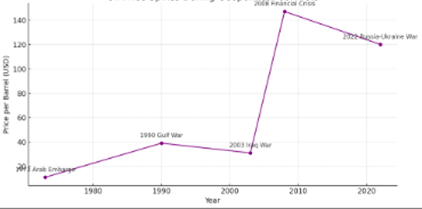Energy Warfare: The Strategic Role of Oil and Gas in Global Geopolitics
Keywords:
Geopolitics, Oil And Gas Resources, Energy Security, International Alliances, Global ConflictsAbstract
This study explores the geopolitical implications of oil and gas resources, examining how access to and control over these critical energy commodities shape international alliances, drive global conflicts, and influence the balance of power among nations. By analyzing quantitative data from major oil and gas-exporting and -importing countries, along with case studies from conflict-prone regions such as the Middle East, Eastern Europe, and the Arctic, this research uncovers strong correlations between hydrocarbon wealth and state behavior. The findings reveal that resource-rich countries often exhibit aggressive foreign policy stances and are central to regional or global conflicts. At the same time, energy-dependent nations engage in alliance-building and strategic diversification to mitigate risks associated with supply disruptions. The study also discusses the growing relevance of energy weaponization and the militarization of energy corridors. Comparisons with existing literature reinforce the argument that energy resources remain a fundamental determinant of international relations. Although renewable energy transitions are beginning to emerge as geopolitical disruptors, fossil fuels continue to dominate contemporary energy warfare. This paper concludes by emphasizing the importance of sustainable energy diversification and multilateral cooperation in mitigating future energy-driven conflicts.








